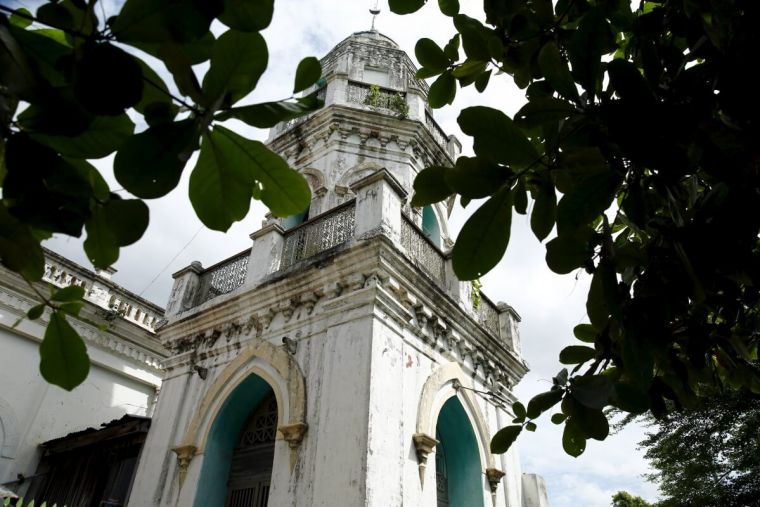Myanmar: Muslims at risk of exclusion from historic election

Mandalay, the second city of Myanmar, is at the centre of inter-religious tensions within the country. The cityscape, dominated by Buddhist temples and monastries, is mirrored by the political landscape. There is only one Mandalay Muslim standing in Myanmar's historic general election on 8 November.
Khin Maung Thein hails from an obscure, small party and runs his campaign from a cluttered, two-story home that doubles as the family printing business.
As the sole Muslim candidate in Mandalay, a stronghold for Buddhist extremists, he is treading where giant rivals won't dare.
The upcoming election has been portrayed as the freest and fairest in decades, but in reality Muslims – both voters and politicians – are facing barriers against participation.
Not even the front-running National League for Democracy (NLD), led by the hugely popular Aung San Suu Kyi, is fielding a Muslim candidate in Mandalay – or, indeed, anywhere else.
Win Mya Mya, the vice-president of the NLD in Mandalay, is one of dozens of Muslims who were rejected from running for parliament on the basis of their faith.
"Our leader Daw Aung San Suu Kyi said I have to go to the country and persuade the Islamic people [to vote for the party] for the election but she doesn't want me to apply as a candidate," Win Mya Mya told The Guardian.
NLD leaders told Reuters they are afraid of antagonizing a Buddhist ultranationalist group called Ma Ba Tha, which is led by monks and wields huge influence in Buddhist-majority Myanmar.
Ma Ba Tha says Islam is eclipsing Buddhism and has called for a boycott of Muslim businesses and a ban on interfaith marriages.
Scores of Muslim candidates have been disqualified and voting rights removed from hundreds of thousands of Rohingya Muslims in western Myanmar.
"Burmese Muslims have told us that they always thought of themselves as Burmese but now suddenly they are being treated as foreigners," Mark Farmaner, director of Burma Campaign UK, told the Guardian.
"It is creating a feeling of alienation and there is a definite move away from integration and towards more concentrated areas in towns and cities where Muslims choose to live."
Increasingly, Muslims have been told to register their race as Indian or Pakistani, regardless of whether that is true, in order to obtain national registration cards, which are necessary for both voting and travel abroad.
Only a dozen or so Muslim candidates are now running in the election nationwide, mostly from Khin Maung Thein's party, the United National Congress (UNC).
"Muslims have been suffering in Myanmar in recent years and this pushed us to go into parliament," said 71-year-old Khin Maung Thein.
He identifies himself as Pathi, a Muslim group with Persian blood and a centuries-old history in Myanmar, and sees the election as a chance to "restore our ethnic pride".
He also wants to promote UNC policies such as reducing the budget of Myanmar's all-powerful military and spending it on education instead.
Muslims make up about 5 per cent of Myanmar's 51 million population. Religious violence has killed hundreds of people, mostly Muslims, since a military-backed civilian government took power in 2011 after nearly half a century of dictatorship. Clashes between Buddhists and Muslims in Myanmar's second-largest city of Mandalay in July 2014 killed two people and left the communities on edge.
Mandalay is home to a leading Ma Ba Tha monk called Wirathu, the self-styled "Burmese bin Laden", who is famous for his anti-Muslim rhetoric.
The group, founded in 2013 and known in English as the Committee for the Protection of Nationality and Religion, is urging people not to vote for Suu Kyi and other NLD candidates for opposing four "race and religion protection" laws.
Ma Ba Tha monks have expressed support for the ruling Union Solidarity and Development Party (USDP), who did back the race and religion laws. The USDP isn't fielding Muslim candidates either.
Khin Maung Thein's UNC party was founded in 2012 and competes in a system that seems stacked against Muslims.
In a September statement, the US State Department noted that Myanmar's election commission had disqualified about 100 candidates, mostly Muslims, "through an opaque and discriminatory process" that could undermine confidence in the election.
Among those disqualified were six of the UNC's 12 candidates, all Muslims. A week later, amid international pressure, the election commission reinstated 11 Muslim candidates, including four from the UNC.
The exclusion of Muslims as both candidates and voters feeds into growing concerns that they are being edged out of public life.
In July, police in Mandalay arrested three people, two of them Muslim, from a respected interfaith group after what family members said was a Ma Ba Tha smear campaign. They remain in custody.
Four others from the same group fled abroad and public interfaith meetings in the city were halted. A Muslim activist told Reuters he had received death threats.
Muslims in and around Mandalay told Reuters they were afraid to go out at night and had stopped traveling in large groups for fear of arbitrary arrest.
Khin Maung Thein, the lone Muslim candidate, is only campaigning in Mandalay's mosques, rather than on its streets, concerned that Ma Ba Tha monks might harass the people he canvasses.
"I can't show up openly and hold campaign rallies," he said.
Additional reporting by Reuters.











